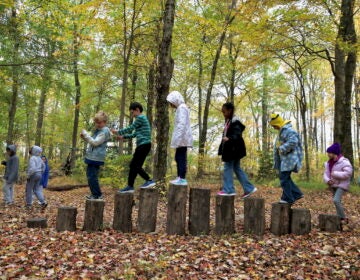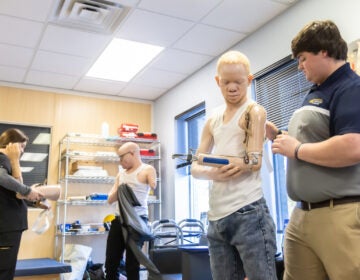N.J. educators get 7 strategies to prepare students for Common Core and PARCC

Partial view of the Common Core logo. (Image via corestandards.org)
They weren’t there to debate its value or argue about whether it should be delayed.
Rather, the approximately 300 New Jersey educators who attended a conference on the Common Core Standards and PARCC testing last week came to learn what they’ll need to teach and do in what many agree will amount to a sea-change in what kids learn and how they’re taught.
Organized by the state Department of Education, the conference held Friday at New Jersey City University was a collection of workshops on everything from explaining specifics of the Common Core standards to how to apply the standards for math to the classroom.
One workshop was for principals and other school leaders. Another dealt specifically with writing instruction and the upcoming online PARCC (Partnership for Assessment of Readiness for College and Careers) exams.
Among the best attended workshops was a session on “seven essential literacy strategies” for integrating the new standards and preparing for the PARCC exams. Taught by NJCU education dean Allan DeFina, the afternoon session drew more than 50 educators.
Over the course of 90 minutes, DeFina laid out the strategies and their challenges, while teachers feverishly took notes about what will be required of them.
In what could offer an important lesson, too, for families whose children will be in those classrooms, here’s a look at those seven strategies, with highlights of each.
1. Focusing on the content required in the new standards and making the connections across disciplines.
DeFina described one sample PARCC question that asked students to compare Abraham Lincoln’s first and second inaugural addresses, and to discuss Lincoln’s different moods in each.
Students wouldn’t automatically make the connection between the two speeches unless they learned from their Social Studies teacher about the Civil War – which took place between Lincoln’s two inaugurations.
“This is not just the job of language arts teachers,” he said.
2. Prepare students for a mix of reading formats, from fiction to informational texts.
DeFina explained that the PARCC tests, along with the standards that guide them, focus especially on informational texts for students to read, a change that was sweeping through New Jersey classrooms even before the new standards.
3. Teach note-taking skills, so that students write down important details and vocabulary as they read.
“The time to tell them to add details is at the beginning, not the end,” he said. “When they are at the end, for them, that means the end.”
4. Teach students to absorb not just the text in the reading, but also the accompanying charts, illustrations, timelines and other features.
“When kids are reading independently, they don’t pay attention to anything but the text,” DeFina said. “When you tell them to read, they are literally just reading.”
5. Teach vocabulary in a way that is meaningful and in context.
This was a wake-up call for many, as DeFina explained that students will not just need to know complex words but how to use them. And some of the old standbys for teaching vocabulary may not be applicable.
“How many of you use word walls?” he asked the educators, alluding to the bulletin boards full of words that are omnipresent in classrooms. “Well, much of the research has found that they don’t work.”
Instead, the boards are best when constantly rotated, and carry no more than 20 or 30 words. “If it’s just decoration, it’s not useful,” he said.
6. Teachers must engage students in a variety of writing experiences where students must cite evidence and use sophisticated vocabulary.
This is the main distinction of the new standards and what they will test: Students, in subsequent testing, will need the ability to write prose backed up with specific evidence.
7 Work collaboratively with other teachers.
DeFina said meeting the standards isn’t about a single language arts teacher in the classroom, but all teachers working together to teach reading skills, research and analysis, in disciplines ranging from social studies to science and even art.
“There are lots of opportunities to work collaboratively in the classroom,” he said. “This is the job for everyone.”
___________________________________
NJ Spotlight, an independent online news service on issues critical to New Jersey, makes its in-depth reporting available to NewsWorks.
WHYY is your source for fact-based, in-depth journalism and information. As a nonprofit organization, we rely on financial support from readers like you. Please give today.




